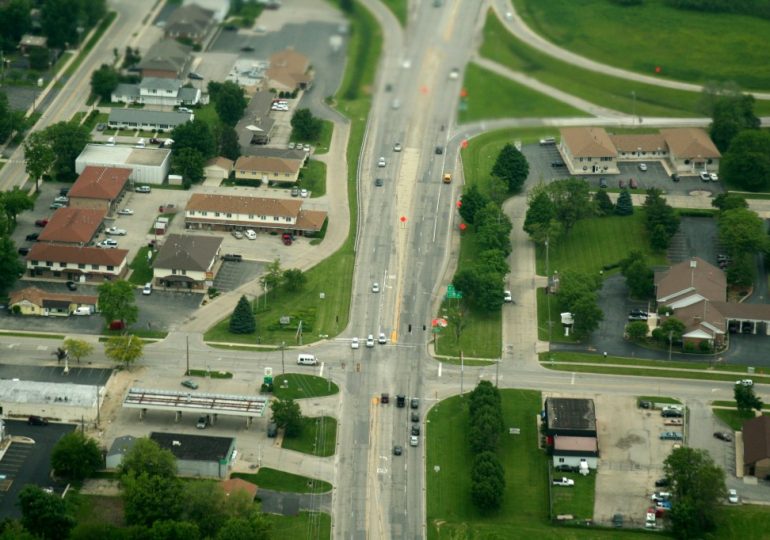A couple in Sugar Grove, Illinois, are hoping that a village board meeting on April 16 will mean a victory for solar energy in their town of 9,000 people nestled amid farms and forest preserves west of Chicago.
And solar advocates say it is an example of the need for a “Solar Rights” bill to pass the legislature, ensuring that municipalities like Sugar Grove can’t unreasonably limit residents’ ability to install rooftop solar.
Becky Brocker and Mike Rayburn are pushing the Sugar Grove village board of trustees to remove a line in the municipal zoning code that bans solar panels on front- or street-facing roofs. This rule will force them to reduce their planned rooftop solar array by 20%, and could make solar entirely impossible for homeowners whose only viable, south-facing rooftop space abuts their front yard.
When rooftop solar came up for debate in 2020 and 2023, village board trustees cited aesthetics and concerns about solar panels becoming decrepit as reasons to hide them from view.
At a March 20 meeting, the village planning commission voted 5-1 to recommend changing the policy. But at its April 2 meeting, the six village board trustees took a straw poll vote and split 3-3, with the village board president breaking the tie against Rayburn and Brocker. The final decision will be made at the village board meeting on April 16.
Planning commission president Larry Jones said he was highly impressed by Rayburn’s presentation at the meeting.
“Beauty is in the eye of the beholder,” Jones said. “The last time I spent any time on this issue, I felt the public opinion and the testimony given was, ‘We think it’s ugly.’ We didn’t find that to be the case this time.”
Jones compared the trajectory of rooftop solar to satellite TV. He remembers the days when unsightly large satellite dishes proliferated on homes, and many municipalities and homeowner’s associations banned them. Today, the technology has changed so much that such dishes are no longer an issue.
“As time goes on, we’re going to see solar panels be the norm,” Jones said. “If I was going to look at buying a new house, I honestly think after listening to Mr. Rayburn and talking to those who have solar, I would want to put solar on all four sides for the additional savings.”
Local pleas
Last summer, Rayburn and Brocker connected with local developer Iconic Energy and applied for a building permit, assuming it would not be a problem. They figured state and federal incentives will cover three-quarters of the $35,000 cost, with a return on investment in less than four years. But the building permit was denied, based on the seven out of 37 planned solar panels that would be visible from the front yard.
Rayburn and Brocker — an air traffic controller and communications professional, respectively — kicked into research and advocacy mode. They filed a request to amend the municipal code, which entails a $765 filing fee.
They researched state law, village board meeting minutes and legal precedents, and filed public records requests regarding past applications for rooftop solar. They found about 50 requests from homeowners seeking permits for solar, they said, and sent them all letters. In response, a number of residents submitted public comments to the village board, asking the municipal policy be changed. Rayburn said he planned to knock on doors before the April 16 meeting.
Science teacher Pat Sweeney wrote to the board that their family met with a contractor, did a rooftop study and applied for various permits, before finally learning of the restriction.
“I called to ask why. No answer could be given other than ‘aesthetics,’” Sweeney wrote. “This is an unacceptable answer. When I see houses with professionally installed solar panels, I don’t see an eyesore. I see a family making a money-saving, green choice.”
“The restrictions seem to be more about aesthetics and not about public safety or any other legitimate concern,” wrote Tony Sally, whose solar array was curtailed and delayed because of the restriction. “Luckily, the 20-panel array still makes solar beneficial for my current electricity consumption, but may limit my family’s future needs.”
Brocker and Rayburn said their interactions with village board members and the April 2 meeting where the straw poll was taken lead them to feel the board is not taking the issue seriously. The village administrator did not respond to a call requesting comment.
“There was nearly zero discussion by the board, and no trustees voiced reasons for any concerns with the petition,” Rayburn said of the April 2 meeting. “There were no questions asked of us. That makes us fear they did not give it any real consideration and some trustees came into this situation with their minds already made up.”
“We’d be more able to accept this fate if we felt like there were well-reasoned arguments on both sides,” added Brocker. “But this doesn’t feel like it’s being heard in good faith.”
Solar delayed means savings denied
Tyler Jones, president of local solar installer Reficiency, noted in an email to the board that utility ComEd is set to change its net metering policies, and 2024 is the last year for households to be grandfathered in under current terms. He said households could see their savings reduced by 40% to 50% if solar installation is delayed.
Jones wrote that during past work in Sugar Grove, the board raised concerns about aesthetics and that “solar panels reflect light to neighboring homes and can cause defects in vinyl siding.” Jones cited research that modern panels only reflect about 2% of incoming light. “We feel that this reason should be seen as outdated and strictly a myth.”
Jones noted that the village also has an outdated mandate that permit applications get a NABCEP Certified Professional stamp, a requirement that made more sense years ago when there were few other regulations governing solar in the state.
“Now, all solar installers have to be DG Certified by the state of Illinois and also be a Licensed Electrician,” wrote Jones. “We feel that this has been set up as another roadblock for installers that only offers further delays to their citizens and causes Installers to be delayed on their permit approval.”
Statewide implications
Sugar Grove appears to be one of few Illinois municipalities that have restrictions on rooftop solar, according to research by solar developers and advocates, in a state with aggressive renewable energy goals and particularly robust incentives for rooftop solar.
On February 29, a Solar Bill of Rights (HB 51315) was introduced in the Illinois state legislature that would prohibit municipalities and counties from preventing rooftop solar installation on homes. The bill would not apply to buildings with shared roofs or over 60 feet tall.
Rayburn said they were glad to hear of the proposed legislation, but do not want to wait on a bill that may not pass before the legislative session ends in May.
In 2020, solar developer Vivint unsuccessfully challenged Sugar Grove’s provision, noting that the village and nearby North Aurora were the only municipalities out of more than 150 where the company had worked to have such restrictions. North Aurora has since changed its policy.
The Chicago suburb of Kildeer in February lifted a complete ban on solar in the face of resident outcry, though it still bans front-facing panels. A 2021 Illinois law prohibits homeowners associations from restricting solar on certain parts of homes or enforcing restrictions that would reduce solar output by more than 10%. But the law does not address municipal government policies.
“Do we really want our village to have one of the most restrictive policies in the state?” Rayburn said during the March 20 planning commission hearing, where he also noted that his electric bills “were dramatically reduced, if not eliminated” thanks to a solar installation at his previous home in nearby Ogle County.
“There are other clear, objective benefits of going solar such as gaining energy independence, increasing home resale value, decreasing the use of non-renewable resources, and providing a barrier against the ever-increasing costs of the supply, delivery, and taxes of traditional power sources,” Rayburn continued.
In meetings this spring, the village board expressed support for an ordinance granting a special use permit for a community solar installation of 500 to 1,000 kilowatts on the grounds of the Aurora airport, within the village boundaries.
A separate county board approved a September 2023 application for a 20-acre community solar array by Turning Point Energy, which would mean $760,000 in property taxes for the Sugar Grove Township which encompasses the village.
Brocker and Rayburn say they support community solar, but they are frustrated the village has supported the airport community solar proposal, while stymying homeowners seeking their own solar.
“Why do you want to be at the back of the pack?” she asked. “Why are you trying to get in front of this moving train? Everyone else is trending toward solar, and our village wants to stay in the past?”
An Illinois town still considers rooftop solar an eyesore. Homeowners hope to change that is an article from Energy News Network, a nonprofit news service covering the clean energy transition. If you would like to support us please make a donation.
Leave a comment





